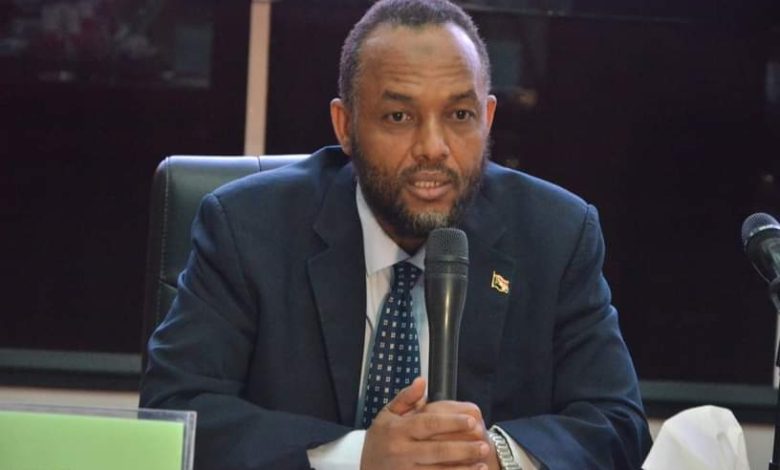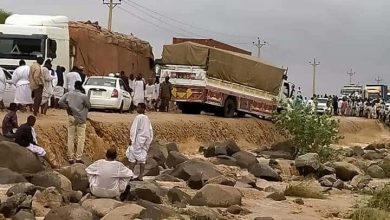In Interview with (Sudan Events), Federal Minister of Health Explains Truth About Supports, Grants and Health Conditions in Sudan

Interview by Nawal Shanan
The health sector in Sudan was affected by the ongoing war between the army and the Rapid Support Militia, which negatively affected the health and medical services provided and a shortage of medicines and consumables, and consequently on citizens, especially in Khartoum State and the states of Darfur. Consequently, what did the Federal Minister of Health-designate, Dr. Haitham Mohamed Ibrahim, say to (Sudan Events) about this and other health issues.
What are the health conditions in Sudan in general?
Khartoum is the most affected state and the states of Darfur, especially West and Central Darfur, followed by South Darfur, as a result of the repeated attacks in the previous months, which led to the loss of most health services, the health system and the supply system in these states. A major warehouse for pharmaceutical supplies was burned and looted, in addition to the cessation of some main services in the main hospitals. As for the rest of the states, health and medical services are running almost normally, in many of the relatively stable states, approximately 12 states out of 18 states, and supplies are arriving almost normally despite the known difficulties in the country such as security difficulties in some locations to deliver them, and the absence of all the packages we need of medicines and medical consumables.
Through our tour of the relatively stable states, it became clear that there was great work and effort in upgrading services, improving the level of provision of therapeutic and diagnostic services, and introducing some specialized surgical services in some states that did not exist before, such as heart surgery, neurosurgery, specialized orthopedic surgery, and replacement of knee joints, gastrointestinal endoscopy services and others. These are all additions to the health system and the decentralized health system. We hope to stabilize the locations that suffer from security threats within Khartoum State and the Darfur states so that service can gradually return to health institutions.
What are the most prominent health threats in Sudan?
Now, the biggest threat is the security threat to the delivery of medical services and supplies to a number of states, the conduct of routine health services such as immunization services, mobile teams, etc. This is also hindered by security threats in the states of Darfur and in some parts of the states of Khartoum and Kordofan, the difficulty of medical teams arriving to provide services, and sometimes the difficulty of supplies arriving where resupply has been subjected to the militia in some locations.
The United Nations High Commissioner for Refugees recently revealed the death of more than 1,200 children under the age of five in nine private camps in White Nile State between May 15 and September 14. What is the truth about this and what is the reason behind this large number of deaths?
First, for your information, the death rate in Sudan among children is 53 out of every 1,000, and it is considered a large rate compared to other countries. There is a strategic plan to reduce these deaths that we have been working on for a long time, and the conditions of war have greatly affected, in general, many causes that lead to death in a large number, not only in the camps, but even in other states. The most important of these reasons is the high rates of malnutrition, acute malnutrition rates reaching 14% in Sudan, and cases of stunting and chronic malnutrition reaching 30%. Recently, some childhood diseases have spread, such as measles, and we have begun a campaign to vaccinate against them in the states where the disease is widespread, including the White Nile and refugee camps, in coordination with a number of organizations. Measles is one of the reasons that leads to an increase in child mortality, and we are trying as much as possible to strengthen the restoration of the program to reduce child mortality through basic health care, supplementary nutrition programs, therapeutic nutrition, and expanded immunization operations in all states. What the Commission reported does not deviate from this rate.
Does the Ministry suffer from a shortage of medicines, medical consumables, equipment, and personnel?
There is no problem with medical personnel and coverage is good in most states. Despite not receiving their entitlements, they committed themselves professionally even in the most difficult situations and circumstances and in critical areas. Some of them were killed and some were assaulted. As for medicines and consumables – yes, there was a shortage even before the war, and we strive as much as possible to fill the gap in medicines and essential consumables to a large extent. We were able to work with various agencies to fill them in most states, especially those related to life-saving medications, intravenous solutions, surgical consumables for trauma operations, some solutions related to dialysis and some other diseases, and there are still gaps in some chronic disease medications, laboratory consumables, and cancer medications now are in the arrangement stage. Part of it is delivered through grants and part through direct purchase through medical supplies and the Ministry.
What are more details about international and regional aid?
First, we are thankful to the regional and international communities for providing assistance to Sudan in this critical circumstance, especially the great support from the countries of the region, neighboring countries, and Arab countries, which played a major role in strengthening health systems, strengthening the supply system, and raising the level of services significantly. As for the international community, we are thankful to the representatives of international and national organizations in Sudan. We aspire and hope for greater assistance and participation from them, and greater support from the international community because Sudan is a large country and the gap is not simple and has high rates of chronic, communicable, non-communicable and tropical diseases and a large percentage of epidemics due to its presence in the tropical region. The volume of aid provided is not the expected size and is less than expected. We hope from the international community that the funds allocated in previous international forums, will reach the country and meet the needs of the health system in the coming period, especially as we hope to rebuild the health system in the various states.
There are complaints that grants do not reach those entitled to them?
Grants not reaching those who deserve them is incorrect, unless the talk is about complaints about the lack of access to anything other than medicines and medical consumables. Our mechanisms for distributing grants, medicines and medical consumables are through medical supply funds spread across all states, and distribution is made to health institutions in the states according to a well-known equation based on criteria represented by a number Population, the number of hospitals and health facilities, the epidemiological map of the specific state, the rate of displaced people in the state. This is how we distribute medicines and consumables to all states and hospitals on a regular basis, and there is no stock at the level of warehouses in the Red Sea. We have a problem represented in delivery to some states, especially Darfur, due to the security problem, and this is the only problem. To address this, an arrangement was made with the regional government to provide an armed (convoy) to deliver medicines and medical consumables to El Fasher, from where they are distributed to the states of the region, and up to Khartoum State, the supply reaches through specific ports from Madani, Gezira State, and the northern countryside of the Nile River.
Some diseases have spread in a number of states in an epidemic manner, such as cholera, measles, and others. What are the ministry’s efforts?
Measles is a disease that spreads in the event of low levels of vaccination in a particular country. The Expanded Immunization Program in Sudan is one of the best programmes, but the security and war conditions reduced the rate of children who were supposed to receive vaccination, and thus the disease spread to 8 states, and cases were monitored and reported and communicated with international organizations, namely World Health Organization. And UNICEF, the availability of the vaccine, and vaccination operations have begun in a number of states, especially the refugee camps in the White Nile and the Blue Nile region, and it will contribute to reducing infections. The cases monitored in all of Sudan exceeded 3 thousand cases, 80% of these cases were unvaccinated, and thus the beginning of vaccination operations significantly reduces the level of the outbreak. As for cholera, it appeared in the border areas with the state of Ethiopia, the eastern Qalabat region, and Ethiopia had previously announced cases of cholera, so it was expected. The samples were cultured and analyzed in the Public Health Laboratory in Port Sudan after the rehabilitation of a reference laboratory for epidemiological examination as an alternative to the Stack Laboratory in Khartoum. It became able to examine and culture the samples and examine the epidemiology, so the cases of watery diarrhea were confirmed as cases of cholera, and the teams moved to Gedaref State from the Ministry and a team of experts from health. Global and UNICEF There are direct field teams for the states that recorded infections, and teams from the medical laboratory to take, examine and analyze samples, as well as supplies and chlorine to sterilize the water, and support from the World Health Organization and UNICEF. Some work is currently underway to reduce infections as much as possible. The number of infections as of the latest report yesterday was 290 cases, including 19 deaths. The supply in the state is stable and sufficient from the World Health Organization, and a control campaign has been organized.
Are hospitals back in service again?
In Khartoum State, most of the hospitals are no longer in service and need to be rehabilitated and repaired for water and electricity and their stability and ensuring that the staff are not exposed, even if there is relative security. Integrated arrangements are made, and most of the hospitals that went out of service are in areas where there are currently no residents, but with the return of citizens to Khartoum, when security and services are available, they will return. Medical service for these areas, but in a number of health centers near the citizens, work was restored and the service began to be provided. I must clarify that local hospitals in Karari and some centers are operating, and also in the outskirts of Khartoum, such as New Dairy.
After the war ends, does the ministry have a vision for the aftermath of the war?
What I mentioned in the last point about rebuilding the health system leads me to answer this question. In fact, we have begun, through our various specialized mechanisms, to develop a post-war scenario and have developed a preliminary plan to rebuild the health system in three stages. The first is the continuity of health response work to epidemics and current health services. The second is to strengthen the decentralized health system and strengthen the hospitals and referral system, and the third stage is the stage of rebuilding the health system in the areas affected by the war, especially Khartoum and the states of Darfur. The broad outlines of the phased plan were drawn up to rebuild the health system in Sudan in a more compatible and practical way so that the states are not affected by each other, a decentralized health system. It is based on the distribution of medical and therapeutic services to achieve justice for the Sudanese citizen.



